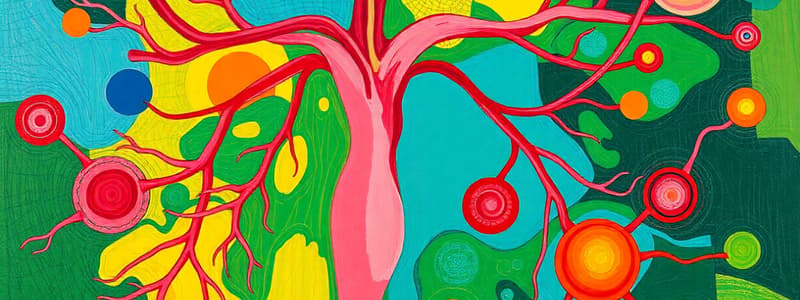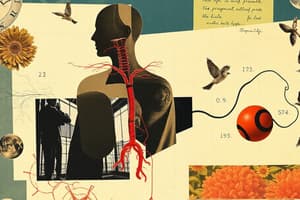Podcast
Questions and Answers
What is the name of the chemical messages used by the endocrine system?
What is the name of the chemical messages used by the endocrine system?
Hormones
What are the major processes controlled by hormones?
What are the major processes controlled by hormones?
- Regulation of metabolism (correct)
- Growth and development (correct)
- Reproduction (correct)
- Mobilization of body defenses (correct)
- Maintenance of homeostasis (correct)
Hormones are produced by specialized cells.
Hormones are produced by specialized cells.
True (A)
Hormones are stored in the blood before they are released.
Hormones are stored in the blood before they are released.
What is the name of the process that maintains hormone levels in the blood?
What is the name of the process that maintains hormone levels in the blood?
What are the two types of stimuli activating endocrine glands?
What are the two types of stimuli activating endocrine glands?
What is the name of the hormone secreted by the thyroid gland that regulates calcium levels in the blood?
What is the name of the hormone secreted by the thyroid gland that regulates calcium levels in the blood?
What are the two major hormones produced by the adrenal medulla?
What are the two major hormones produced by the adrenal medulla?
What is the name of the hormone produced by the pancreas that lowers blood glucose levels?
What is the name of the hormone produced by the pancreas that lowers blood glucose levels?
What gland is responsible for secreting melatonin?
What gland is responsible for secreting melatonin?
What gland is important for the development of the immune system?
What gland is important for the development of the immune system?
Estrogen is produced by the ovaries.
Estrogen is produced by the ovaries.
Progesterone is produced by the corpus luteum.
Progesterone is produced by the corpus luteum.
What is the name of the most important androgen produced by the testes?
What is the name of the most important androgen produced by the testes?
The placenta produces hormones that maintain pregnancy.
The placenta produces hormones that maintain pregnancy.
The endocrine glands generally function more efficiently as we age.
The endocrine glands generally function more efficiently as we age.
Flashcards
Endocrine System
Endocrine System
A system that uses chemical messengers (hormones) released into the bloodstream to regulate various bodily processes.
Hormones
Hormones
Chemical messengers produced by specialized cells and secreted into the bloodstream.
Amino Acid-Based Hormones
Amino Acid-Based Hormones
Hormones made from amino acids, including proteins, peptides, and amines.
Steroid Hormones
Steroid Hormones
Signup and view all the flashcards
Prostaglandins
Prostaglandins
Signup and view all the flashcards
Target Cells or Organs
Target Cells or Organs
Signup and view all the flashcards
Negative Feedback
Negative Feedback
Signup and view all the flashcards
Hormonal Stimuli
Hormonal Stimuli
Signup and view all the flashcards
Humoral Stimuli
Humoral Stimuli
Signup and view all the flashcards
Pituitary Gland
Pituitary Gland
Signup and view all the flashcards
Anterior Pituitary
Anterior Pituitary
Signup and view all the flashcards
Posterior Pituitary
Posterior Pituitary
Signup and view all the flashcards
Growth Hormone (GH)
Growth Hormone (GH)
Signup and view all the flashcards
Prolactin (PRL)
Prolactin (PRL)
Signup and view all the flashcards
Adrenocorticotropic Hormone (ACTH)
Adrenocorticotropic Hormone (ACTH)
Signup and view all the flashcards
Thyroid-Stimulating Hormone (TSH)
Thyroid-Stimulating Hormone (TSH)
Signup and view all the flashcards
Gonadotropic Hormones
Gonadotropic Hormones
Signup and view all the flashcards
Follicle-Stimulating Hormone (FSH)
Follicle-Stimulating Hormone (FSH)
Signup and view all the flashcards
Luteinizing Hormone (LH)
Luteinizing Hormone (LH)
Signup and view all the flashcards
Oxytocin
Oxytocin
Signup and view all the flashcards
Antidiuretic Hormone (ADH)
Antidiuretic Hormone (ADH)
Signup and view all the flashcards
Thyroid Gland
Thyroid Gland
Signup and view all the flashcards
Thyroid Hormone
Thyroid Hormone
Signup and view all the flashcards
Calcitonin
Calcitonin
Signup and view all the flashcards
Parathyroid Glands
Parathyroid Glands
Signup and view all the flashcards
Parathyroid Hormone
Parathyroid Hormone
Signup and view all the flashcards
Adrenal Glands
Adrenal Glands
Signup and view all the flashcards
Adrenal Cortex
Adrenal Cortex
Signup and view all the flashcards
Adrenal Medulla
Adrenal Medulla
Signup and view all the flashcards
Study Notes
The Endocrine System
- The endocrine system is a second messenger system in the body
- It uses chemical messages called hormones, released into the bloodstream
- Hormones control major bodily processes, including:
- Reproduction
- Growth and development
- Body defense mechanisms
- Homeostasis
- Metabolism regulation
Hormone Overview
- Specialized cells produce hormones
- Cells release hormones into extracellular fluids
- Blood carries hormones to target cells
- Hormones regulate the activity of other cells
Chemistry of Hormones
- Amino acid-based hormones:
- Proteins
- Peptides
- Amines
- Steroids: derived from cholesterol
- Prostaglandins: made from highly active lipids
Mechanisms of Hormone Action
- Hormones affect specific target tissues or organs
- Target cells must have specific protein receptors
- Hormone binding impacts the cell's function
Control of Hormone Release
- Blood hormone levels are regulated by negative feedback
- A stimulus or low hormone levels trigger hormone release
- Hormone release stops when the appropriate blood level is reached
Hormonal Stimuli of Endocrine Glands
- Endocrine glands are activated by other hormones
- Changing blood levels of certain ions can stimulate hormone release
Location of Major Endocrine Organs
- Pituitary gland: size of a grape, hangs from the hypothalamus, protected by the sphenoid bone, two functional lobes (anterior and posterior)
Hormones of the Anterior Pituitary
- Six anterior pituitary hormones
- Two affect non-endocrine targets
- Four stimulate other endocrine glands (tropic hormones)
- All anterior pituitary hormones are proteins or peptides
- Regulated by hormonal stimuli, mostly negative feedback
Growth Hormone (GH)
- General metabolic hormone, primarily affecting skeletal muscle and bone growth
- Influences protein synthesis, breakdown of fats, and amino acid absorption
Functions of Other Anterior Pituitary Hormones
- Prolactin (PRL): stimulates milk production after childbirth; function in males is unknown
- Adrenocorticotropic hormone (ACTH): regulates the adrenal cortex endocrine activity
- Thyroid-stimulating hormone (TSH): influences thyroid growth and activity
- Gonadotropic hormones: regulate the gonads (ovaries and testes)
- Follicle-stimulating hormone (FSH): stimulates follicle development in ovaries and sperm development in testes
- Luteinizing hormone (LH): triggers ovulation and stimulates testosterone production
Hormones of the Posterior Pituitary
- Oxytocin: stimulates uterine contractions during labor and milk ejection
- Antidiuretic hormone (ADH): inhibits urine production and increases blood pressure
Thyroid Gland
- Located in the throat
- Consists of two lobes connected by an isthmus
- Produces thyroid hormone and calcitonin
Thyroid Hormones
- Major metabolic hormone
- Composed of two active iodine-containing hormones (T4 and T3)
- T3 and T4 conversion at target tissues
Calcitonin
- Decreases blood calcium levels by promoting deposition on bones
- Antagonistic to parathyroid hormone
Parathyroid Glands
- Tiny masses on the posterior of the thyroid
- Secrete parathyroid hormone
- Stimulate removal of calcium from bone
- Stimulate absorption of calcium
- Raises blood calcium levels
Adrenal Glands
- Two glands (cortex and medulla), located atop the kidneys
- Cortex: outer region with three layers
- Medulla: inner neural tissue region
Hormones of the Adrenal Cortex
- Mineralocorticoids (mainly aldosterone): regulate mineral content, water, and electrolyte balance; stimulated by renin and aldosterone, inhibited by ANP
- Glucocorticoids (cortisone and cortisol): promote normal cell metabolism, help resist long-term stress; released in response to ACTH
- Sex hormones: produced in inner layer; androgens (male), estrogens (female)
Hormones of the Adrenal Medulla
- Produces epinephrine and norepinephrine (catecholamines) - prepares the body for short-term stress
Pancreatic Islets
- Pancreas is a mixed gland
- Islets produce insulin and glucagon
- Insulin: allows glucose to enter cells from the blood to lower blood sugar
- Glucagon: moves glucose from storage sites back into the blood to raise blood sugar
- Blood sugar homeostasis maintained by insulin and glucagon responses
Pineal Gland
- Located in the brain's third ventricle
- Secretes melatonin
- Influences wake/sleep cycles
Thymus
- Located posterior to the sternum
- Largest in infants and children
- Produces thymosin that matures some types of white blood cells
- Important in developing the immune system
Hormones of the Ovaries
- Estrogens: Produced by Graafian follicles or placenta, promoting female characteristics and reproductive organs, preparing the uterus for fertilization, maintaining pregnancy, and breast preparation
- Progesterone: Produced in the corpus luteum, working with estrogen to regulate the menstrual cycle, aiding in embryo implantation
Hormones of the Testes
- Interstitial cells produce androgens, mainly testosterone
- Important for secondary sex characteristics of males, maturation of the male reproductive system, and sperm production
Other Hormone-Producing Tissues/Organs
- Parts of the small intestine, stomach, kidneys, and heart also produce hormones.
Endocrine Function of the Placenta
- Produces hormones that maintain pregnancy, some helping in delivery.
Developmental Aspects of the Endocrine System
- Most endocrine organs function normally until old age.
- Menopause occurs due to ovarian function decrease.
- Hormone production generally decreases with age.
Studying That Suits You
Use AI to generate personalized quizzes and flashcards to suit your learning preferences.




